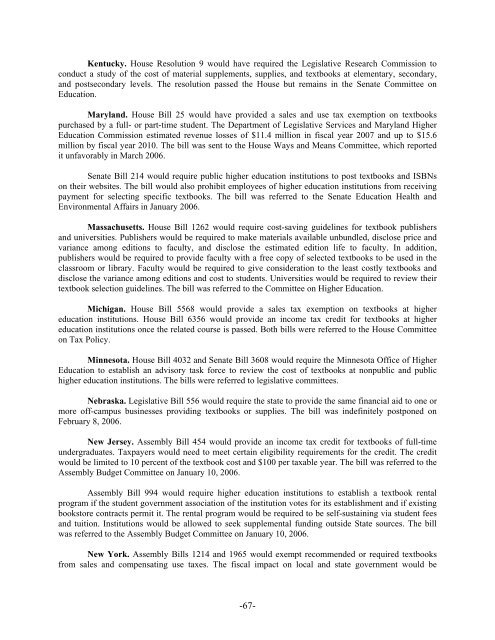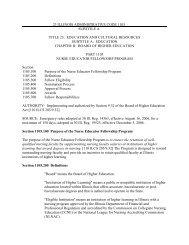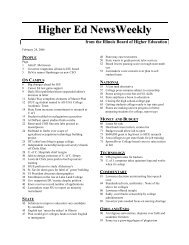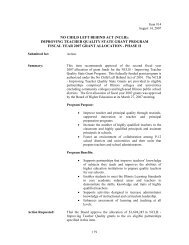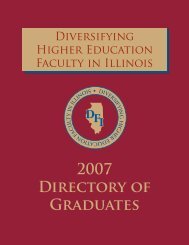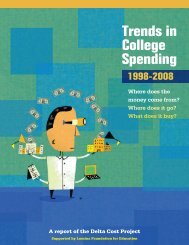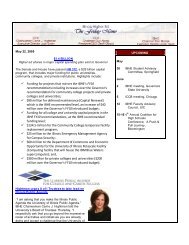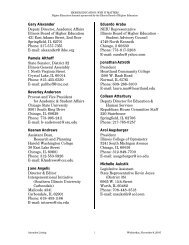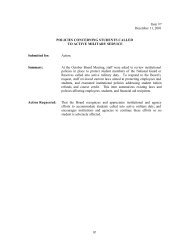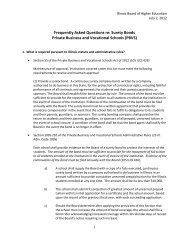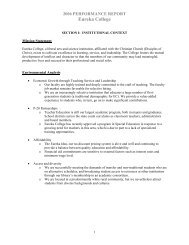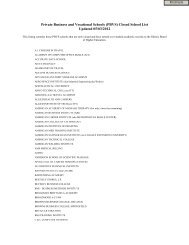A Report on the Feasibility of Textbook Rental - IBHE
A Report on the Feasibility of Textbook Rental - IBHE
A Report on the Feasibility of Textbook Rental - IBHE
Create successful ePaper yourself
Turn your PDF publications into a flip-book with our unique Google optimized e-Paper software.
Kentucky. House Resoluti<strong>on</strong> 9 would have required <strong>the</strong> Legislative Research Commissi<strong>on</strong> toc<strong>on</strong>duct a study <strong>of</strong> <strong>the</strong> cost <strong>of</strong> material supplements, supplies, and textbooks at elementary, sec<strong>on</strong>dary,and postsec<strong>on</strong>dary levels. The resoluti<strong>on</strong> passed <strong>the</strong> House but remains in <strong>the</strong> Senate Committee <strong>on</strong>Educati<strong>on</strong>.Maryland. House Bill 25 would have provided a sales and use tax exempti<strong>on</strong> <strong>on</strong> textbookspurchased by a full- or part-time student. The Department <strong>of</strong> Legislative Services and Maryland HigherEducati<strong>on</strong> Commissi<strong>on</strong> estimated revenue losses <strong>of</strong> $11.4 milli<strong>on</strong> in fiscal year 2007 and up to $15.6milli<strong>on</strong> by fiscal year 2010. The bill was sent to <strong>the</strong> House Ways and Means Committee, which reportedit unfavorably in March 2006.Senate Bill 214 would require public higher educati<strong>on</strong> instituti<strong>on</strong>s to post textbooks and ISBNs<strong>on</strong> <strong>the</strong>ir websites. The bill would also prohibit employees <strong>of</strong> higher educati<strong>on</strong> instituti<strong>on</strong>s from receivingpayment for selecting specific textbooks. The bill was referred to <strong>the</strong> Senate Educati<strong>on</strong> Health andEnvir<strong>on</strong>mental Affairs in January 2006.Massachusetts. House Bill 1262 would require cost-saving guidelines for textbook publishersand universities. Publishers would be required to make materials available unbundled, disclose price andvariance am<strong>on</strong>g editi<strong>on</strong>s to faculty, and disclose <strong>the</strong> estimated editi<strong>on</strong> life to faculty. In additi<strong>on</strong>,publishers would be required to provide faculty with a free copy <strong>of</strong> selected textbooks to be used in <strong>the</strong>classroom or library. Faculty would be required to give c<strong>on</strong>siderati<strong>on</strong> to <strong>the</strong> least costly textbooks anddisclose <strong>the</strong> variance am<strong>on</strong>g editi<strong>on</strong>s and cost to students. Universities would be required to review <strong>the</strong>irtextbook selecti<strong>on</strong> guidelines. The bill was referred to <strong>the</strong> Committee <strong>on</strong> Higher Educati<strong>on</strong>.Michigan. House Bill 5568 would provide a sales tax exempti<strong>on</strong> <strong>on</strong> textbooks at highereducati<strong>on</strong> instituti<strong>on</strong>s. House Bill 6356 would provide an income tax credit for textbooks at highereducati<strong>on</strong> instituti<strong>on</strong>s <strong>on</strong>ce <strong>the</strong> related course is passed. Both bills were referred to <strong>the</strong> House Committee<strong>on</strong> Tax Policy.Minnesota. House Bill 4032 and Senate Bill 3608 would require <strong>the</strong> Minnesota Office <strong>of</strong> HigherEducati<strong>on</strong> to establish an advisory task force to review <strong>the</strong> cost <strong>of</strong> textbooks at n<strong>on</strong>public and publichigher educati<strong>on</strong> instituti<strong>on</strong>s. The bills were referred to legislative committees.Nebraska. Legislative Bill 556 would require <strong>the</strong> state to provide <strong>the</strong> same financial aid to <strong>on</strong>e ormore <strong>of</strong>f-campus businesses providing textbooks or supplies. The bill was indefinitely postp<strong>on</strong>ed <strong>on</strong>February 8, 2006.New Jersey. Assembly Bill 454 would provide an income tax credit for textbooks <strong>of</strong> full-timeundergraduates. Taxpayers would need to meet certain eligibility requirements for <strong>the</strong> credit. The creditwould be limited to 10 percent <strong>of</strong> <strong>the</strong> textbook cost and $100 per taxable year. The bill was referred to <strong>the</strong>Assembly Budget Committee <strong>on</strong> January 10, 2006.Assembly Bill 994 would require higher educati<strong>on</strong> instituti<strong>on</strong>s to establish a textbook rentalprogram if <strong>the</strong> student government associati<strong>on</strong> <strong>of</strong> <strong>the</strong> instituti<strong>on</strong> votes for its establishment and if existingbookstore c<strong>on</strong>tracts permit it. The rental program would be required to be self-sustaining via student feesand tuiti<strong>on</strong>. Instituti<strong>on</strong>s would be allowed to seek supplemental funding outside State sources. The billwas referred to <strong>the</strong> Assembly Budget Committee <strong>on</strong> January 10, 2006.New York. Assembly Bills 1214 and 1965 would exempt recommended or required textbooksfrom sales and compensating use taxes. The fiscal impact <strong>on</strong> local and state government would be-67-


